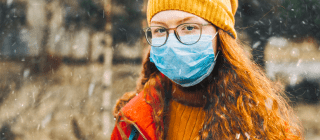Why People Are Still Getting COVID-19

COVID-19 isn’t going away anytime soon, and infections are expected to rise this winter in Vermont. In this article, we discuss the latest variants, vaccination tips, and expert insights on staying safe in the months ahead.
More than four years after it first swept around the world, the COVID-19 virus is still making many of us sick. COVID-19 infections increased sharply in the U.S. this past summer and are expected to continue rising this fall and winter.
The number of diagnosed COVID-19 cases in Vermont will probably reach an average of more than 40 per week in December and January, when the virus typically hits its winter peak. In this article, we’ll talk about the reasons why people are still getting COVID-19, and let you know how to best protect yourself and your family in the months ahead.
Is COVID-19 Endemic?
The World Health Organization says COVID-19 is now “well established and ongoing.” That doesn’t mean the pandemic is over, but the public health emergency is. Many experts say COVID-19 has now entered an endemic phase, where the disease is a constant presence. Other diseases that are endemic include influenza, malaria, and tuberculosis. They still cause illnesses and deaths every year but spread in predictable ways.
Endemic diseases are an ongoing threat that we’ve learned to live with. Vaccines are available to prevent infections and pharmaceuticals can be used to manage disease symptoms. Some experts, however, are reluctant to characterize COVID-19 as being endemic. They say it is still too unpredictable, pointing to recent surges of the virus that have been bigger than expected.
Why It’s Still Around
There is no debate that COVID-19 is still a major health problem, here in the U.S. and around the world. Why is COVID-19 continuing to spread? The reasons include:
- New variants. The COVID-19 virus continues to change, forming new versions. More than 50 variants have been identified. Some spread more easily than others and can evade the immunity protection provided by vaccines.
- Low vaccination rates. Only 26% of Vermonters received a COVID-19 vaccine between September 2023 and July 2024, according to the Vermont Department of Health. Just 24% of U.S. adults say they will definitely get this year’s COVID-19 vaccine, according to surveys by the Centers for Disease Control and Prevention. Almost half of adults say they don’t expect to get the most recent vaccine.
- Reinfection. Once you’ve had COVID-19, your immune system should protect you from getting it again for several months. However, this immunity weakens as time goes by and you can be reinfected, especially if you’re exposed to a new strain of the virus. People who are reinfected can pass it onto family members, coworkers, and others they come into contact with.
A major reason that COVID-19 is persisting has to do with the unusual pattern it’s following. Respiratory illnesses like colds and the flu typically increase in the winter and subside during the summer months. But COVID-19 isn’t following this usual seasonal ebb and flow. In addition to a winter surge, there’s also been a summer wave of COVID-19 cases.
In 2024, the number of emergency department visits in Vermont with a COVID-19 diagnosis started to climb in May, according to the Weekly COVID-19 Surveillance Report from the Vermont Department of Health. COVID-19 emergency department cases rose from a seven-day average of less than five in May to more than 25 per week in August and September.
The amount of COVID-19 in wastewater — a good measure of how active the virus is — rose from low levels in May to high levels in early August, according to the Centers for Disease Control and Prevention. This sharp increase was seen in all regions of the country.
As the weather turns colder and people spend more time together indoors, especially during the holidays, the number of COVID-19 infections is expected to spike again.
What You Can Do
Getting the latest COVID-19 booster vaccination remains the single best thing you can do to protect yourself. The shot that is now available has been updated to provide immunity from new virus variants that are circulating.
A few things to remember about COVID-19 vaccinations:
- It takes about two weeks after vaccination for immunity to fully develop.
- You may still get COVID-19 after being vaccinated, but the severity should be much less.
- It’s important to protect yourself from both COVID-19 and the flu, especially as we head into flu season. You can get both vaccinations at the same time and even get them in the same arm, if you want. Check out our blog for answers on flu shot questions.
- COVID-19 vaccinations are covered at no cost for Blue Cross Vermont members.
- Practicing good hygiene and maintaining healthy habits are also important. Check out our blog on respiratory virus season for more information.
People who are at high risk of severe symptoms from COVID-19 infection, such as those who are over age 65 or have certain medical conditions, may want to consider getting vaccinated both in the fall and at the beginning of summer. This will offer the most protection at times when COVID-19 infections are peaking. High-risk individuals could also wear a mask while traveling or attending large indoor events.
Keep Your Guard Up
Experts are unsure whether COVID will become a one-season respiratory illness, like influenza, or if it will continue to persist year-round. They say it will be a few years until we know the long-term pattern. In the meantime, it’s best to always keep your guard up — in the winter and also when the weather is warmer.



